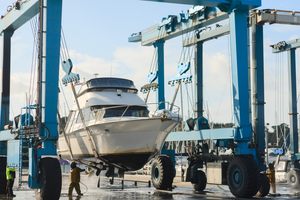When buying a boat, whether new or used, a bill of sale is a fundamental document that facilitates a smooth and legally sound transaction. The document acts as a formal record of the sale, providing essential details about the boat and the terms of the agreement between the buyer and seller.
A Bill of Sale for a boat is a legal document that records the transfer of ownership of a vessel from the seller to the buyer. It acts as proof that the sale took place and includes important information such as:
- Names and contact details of both buyer and seller
- Date of sale
- Description of the boat (make, model, year, hull ID number)
- Sale price
- Details of any included accessories or trailers
- Odometer reading (if applicable for motorized vessels)
- Signatures of both parties
- Notary section (optional but recommended in many states/countries)
A bill of sale for a boat is more than just a piece of paper in the boat sales process; it is a legally binding contract that confirms the transfer of ownership and details the terms of the boat sale. The document helps prevent disputes and ensures that the transaction complies with legal requirements, making it an indispensable part of the boat-buying process. Understanding its purpose and components is important for both parties to ensure clarity and protect their interests.
Bill of Sale as a Legal Document
A bill of sale is a legal document that records the details of a transaction involving the sale of a boat. It typically includes information such as the boat's make, model, year, and hull identification number (HIN), as well as the sale price and the names and addresses of both the buyer and seller. This document serves as proof of the transfer of ownership from the seller to the buyer.
Why a Bill of Sale Matters:
- It provides legal proof of the transaction.
- It’s often required for boat registration or title transfer.
- It protects both parties in case of future disputes about ownership or condition at time of sale.
Some regions or U.S. states also require an official bill of sale template or additional forms, especially if you're transferring a title or registering the boat under a new name.


Ideally, when buying a boat, the seller should provide all original bills of sale, documenting the chain of ownership from the first owner to the current one. This ensures that the boat's ownership history is transparent and verifiable, reducing the risk of disputes or potential legal issues.
These documents serve as a record that the boat has been legally and properly transferred between owners over time, confirming that the seller has the right to sell the boat and that the buyer will receive a clear title. Here's Bill of Sale purpose at a glance:
| Documentation | Purpose | Why It’s Important |
|---|---|---|
| Original Bills of Sale | Proof of each transfer of ownership from the first owner to the current seller | Ensures a verifiable chain of ownership, minimizing risk of legal disputes or fraud. |
| Ownership History Records | Provides a timeline of previous owners and transactions | Increases buyer confidence and confirms the seller has the right to sell the boat. |
| Clear Title Assurance | Guarantees the boat is not stolen, encumbered, or subject to lien | Helps the buyer receive a clean title, making future registration or resale smoother. |
How a Bill of Sale Protects the Boat Buyer and the Seller
For the boat buyer, a bill of sale provides legal proof of ownership and a record of the transaction, which is required for registration and insurance purposes.
It can also be used to verify that the boat is free of liens and that the seller has the right to transfer ownership.
For the seller, the bill of sale offers protection by documenting the completion of the sale and the transfer of responsibility. This can help prevent future disputes regarding the boat's ownership and condition.
Key Components of Yacht Bill of Sale
| Bill of Sale Element | Description | Why It Matters |
|---|---|---|
| Boat Identification | Includes the boat’s make, model, year, Hull Identification Number (HIN), registration number, and engine details if applicable. | Accurately identifies the vessel being sold and ties the bill of sale to a specific boat. |
| Sale Price | The agreed-upon amount paid by the buyer to the seller, clearly stated in U.S. dollars or local currency. | Serves as the official record of the transaction value for tax, insurance, and legal purposes. |
| Date of Transaction | The full date when the sale takes place (MM/DD/YYYY). | Establishes the effective change of ownership and is often required for title transfer and registration. |
| Signatures | Signatures of both the buyer and seller, often accompanied by printed names and contact details. | Validates the agreement and confirms consent from both parties; some jurisdictions require notarization. |
| Warranties or Disclaimers | Details any guarantees made by the seller or a clear “sold as-is” statement if no warranty is offered. | Prevents future disputes by documenting the condition of the boat and the seller’s responsibilities. |
| Additional Terms (Optional) | Can include terms such as delivery date, trailer inclusion, or conditions like pending inspection or financing. | Adds clarity to the transaction and protects both parties by outlining any special conditions or inclusions. |

Bill of Sale: USA vs. UK – Key Differences and Historical Insight
When it comes to transferring ownership of a boat, the process and documentation vary slightly between the United States and the United Kingdom. Understanding these regional differences is essential for ensuring a smooth and legally valid sale.
UK Boat Bill of Sale (MSF 4705)
In the United Kingdom, transferring boat ownership involves the use of the UK Maritime and Coastguard Agency (MCA) form known as the Bill of Sale (MSF 4705). This four-page document does more than finalize the sale — it also records the change of ownership with the UK Ship Registry.
The buyer’s title to the boat is not considered legally complete until the sale is registered and a new certificate of ownership is issued by the Registry. This makes the UK process more formal and legally binding through central registration.
US Boat Bill of Sale (CG-1340)
In the United States, vessels documented with the U.S. Coast Guard use the CG-1340 Bill of Sale — a two-page form issued by the Department of Homeland Security. While shorter and more straightforward, it fulfills the same critical role of legally transferring ownership and enabling the new owner to register or document the boat in their name.
Not all boats in the U.S. require federal documentation; some are only registered at the state level, and in such cases, a state-specific bill of sale may be used instead.
A Historical Note: The 64 Shares System
An intriguing part of maritime law — especially in the UK — is the “64 shares” system. This tradition, stemming from the Merchant Shipping Act of 1894, divided vessel ownership into 64 equal parts. The system allowed for fractional ownership among multiple parties, often used in commercial shipping and larger yachts.
While less common in personal boat transactions today, this method still applies to larger, documented vessels and offers a glimpse into the rich legacy of maritime regulation that still influences today’s paperwork and legal practices.
Looking for a yacht for sale - without a hassle?
No documentation? No deal. If the seller of the boat is unable to provide full documentation for the boat, consider walking away. There are other yachts for sale! Explore our curated selection of listings—each one carefully vetted for authenticity, build quality, and operational history. Whether you're searching for a performance cruiser, a long-range explorer, or a proven used yacht for sale, YachtBuilder platform connects serious buyers with reliable options from established builders. Start your search with confidence—every yacht we feature meets our standards for transparency and accuracy








